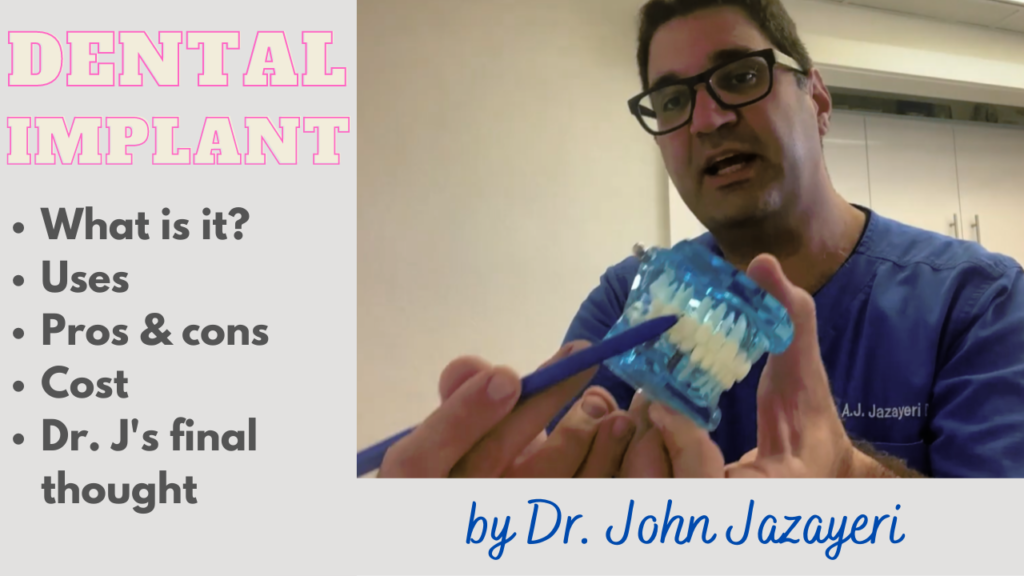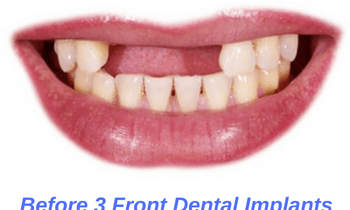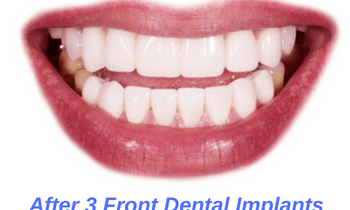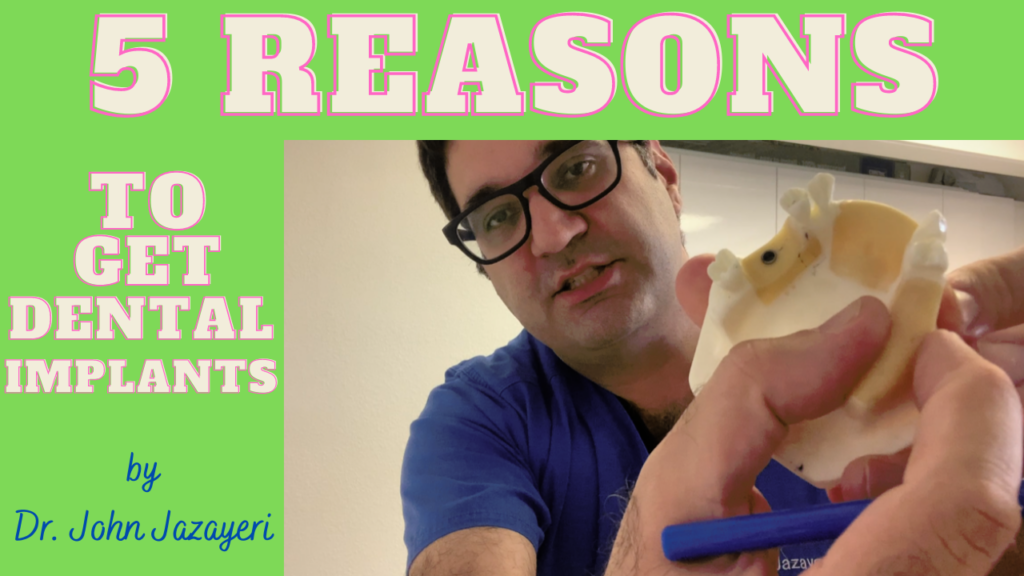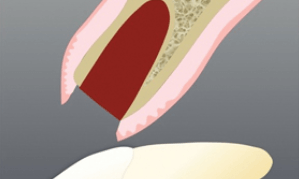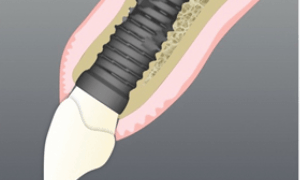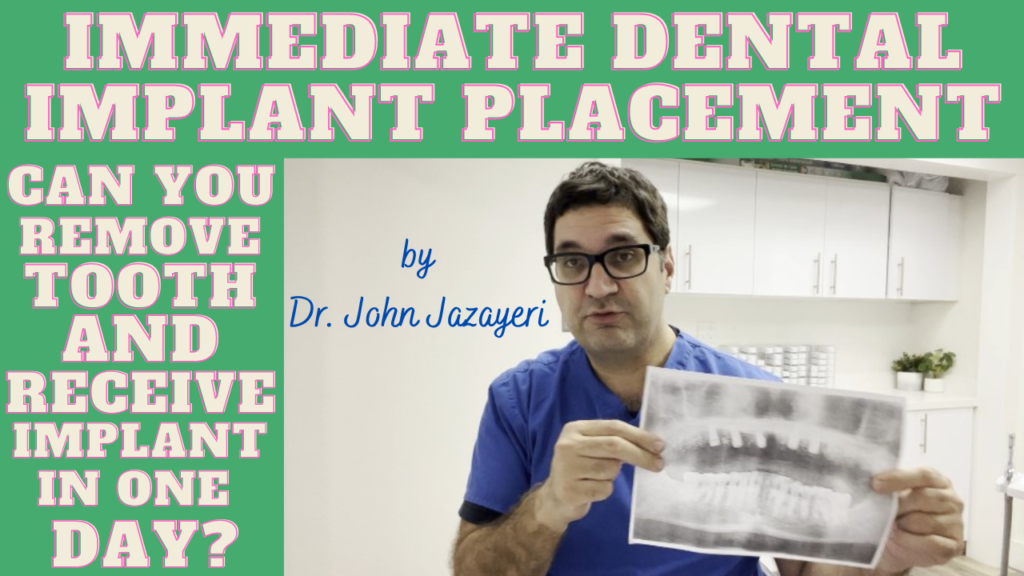Table of Content
- What are dental implants?
- Why are dental implants so popular?
- What are dental implants made from?
- How long does dental implant treatment take?
- Can you place a dental implant at the same time as removing a tooth?
- Can you receive your implant and crown right away?
- How do I clean my dental implant(s)?
- Dental implants in Orange County, CA
What are dental implants?
Dental implants are artificial teeth that your dentist fabricates to replace missing natural teeth. Dental implants are widely considered to be the best way to replace missing teeth. By placing a dental implant you can replace an entire missing tooth with a permanent dental prosthesis. It turns out that dental implant is a rather complex process. Most dental implants consist of three major parts which are the implant fixture, abutment, and implant crown. Here's what you need to know about these parts:
Implant Fixture
The implant fixture, or post, is the actual screw that is inserted into the jawbone. Implant fixtures are designed to mimic the tooth root. The implant fixture goes on to support the eventual crown that replaces the missing tooth. Most implant fixtures are made from titanium alloy. Titanium is lightweight and bio-compatible, making it the perfect material for dental implant fixtures. In fact, titanium is the same material that is used for fabricating knee and hip replacement prosthetics. More recently, zirconia dental implants have been introduced to the market as well. Zirconia dental implants are a good option for those who are allergic to metals or suffer from certain autoimmune conditions.
Implant Crown
The implant crown is the part that replaces the missing tooth. Implant crowns are not that different from other crowns you may already have in your mouth. There are two basic types of implant crowns, one is known as a cement-retained crown and the other is a screw-retained crown. Cement-retained crowns are glued on top of the implant abutment. Cement-retained crowns are ideal for restoring front teeth. Screw-retained crowns have a small access hole that allows your dentist to remove the crown if needed. Screw-retained crowns are better suited for restoring back teeth. They are also a better option for cases with limited restorative space. Your dentist will determine which type of implant crown is best suited to your needs.
Implant Abutment
Think of the abutment as the intermediate part that connects the implant fixture to the implant crown. Implant abutments come in many different sizes, materials, and styles. For instance, the abutment may be made from metal, gold, or even zirconia. Abutments come as straight or angled, custom or standard, temporary or permanent, etc. Your dentist will determine if there's a specific type of abutment that's best for restoring your dental implant.
Why are dental implants so popular?
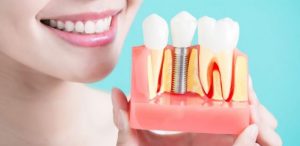
Dental implant technology has been around for several decades now. Time has proven that dental implants are the best way to replace your missing teeth. Dental implants are superior to alternative treatment options, including bridges and dentures. So why are dental implants such a great treatment option? Here are some of the main reasons why placing dental implants in your mouth is a wise investment in your oral health:
Dental Implant Do No Harm!
One of the major benefits of dental implants is that they do not harm other teeth. This can not be said of bridges and dentures. In order to place a bridge, your dentist must shave down one or more adjacent teeth. This can lead to problems with the anchoring teeth over time. A large percentage of dental bridges fail within five to ten years. Should this happen, you now have one or more missing teeth than when you first received your bridge! Similarly, wearing partial dentures causes damage to the remaining teeth. Particularly, the teeth used as anchors to hold your partial denture in place are vulnerable. These anchor teeth tend to become loose and develop cavities over time, which causes you to lose even more teeth.
Extremely Sturdy & Durable
Again, dental implants are superior in quality and longevity to both bridges and dentures. A well-placed dental implant should last you a lifetime. On the other hand, most bridges and dentures typically last several years before requiring a replacement. In many cases, bridges and dentures cost you more time and money in the long run as compared to dental implants.
Excellent Chewing Efficiency
If you like to eat without any worries, then dental implants are the right option for you. Dental implants offer the same chewing efficiency as natural teeth do. In contrast, dentures offer only about 25 to 40% chewing ability as compared to natural teeth. Bridges allow you to chew just fine, however, bridges place additional force on the anchoring teeth which damages them over time.
Jawbone Preservation
One of the most important functions of dental implants is to preserve your jawbone structure. Once you lose teeth, your jaw starts to shrink at an accelerated rate. Placing dental implants preserves the jawbone in the same way that natural teeth do. The body does not distinguish between a dental implant fixture or a tooth root. Therefore, dental implants induce bone remodeling to preserve bone structure exactly as teeth do. Unfortunately, neither bridges nor dentures do much to help with bone preservation. Wearing dentures and bridges causes your jawbone to shrink at an accelerated rate. Over time, this could lead to the collapse of your facial muscles causing you to wrinkle and look older than you actually are.
Placing and restoring dental implants has become simpler and more affordable than ever. With advancements in modern dentistry, almost everyone is a candidate for dental implant placement. Talk to a dental implant specialist near you to learn more about dental implants. There's a good chance that there is an affordable solution involving dental implants to help you replace your missing teeth.
What are dental implants made from?
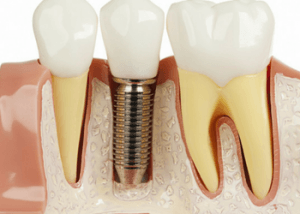
The dental implant fixture is typically made from titanium alloys
As mentioned earlier, each dental implant consists of three individual parts: the implant fixture, abutment, and implant crown. Different implant parts are made from different materials:
Implant Fixture Material
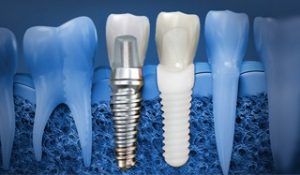
More recently, zirconia implant fixtures have been introduced to the market
The implant fixture, or implant post, is the part that sits inside the jawbone. Since this is the most important part of the dental implant, the material choice is very critical. Most implant fixtures are made from medical-grade titanium alloy. Titanium is the metal of choice for use inside the body. This is because titanium is durable, lightweight, and non-allergenic. More recently, the FDA has approved dental implants made from zirconia. Zirconia implants offer an alternative treatment option to titanium for those who are opposed to having traditional metals in their mouth due to safety and health concerns. Zirconia implants are still a relatively new technology with limited use in dentistry.
Implant Crown Material
Implant crowns are made from the same material as other crowns. Most dentists prefer to use porcelain-fused-to-metal (PFM) or zirconia for implant crowns. Gold crowns are an option although very few people go for gold nowadays. Porcelain and zirconia offer great aesthetics, superior function, and excellent durability. Zirconia crowns are stronger than porcelain and less likely to fracture with repeated use. Talk to your dentist to determine which material is best for your implant crown restoration.
Abutment Material
The implant abutment is the intermediate part that connects the implant fixture to the crown. Most implant abutments are made from various metals. Ceramic and gold abutments may be available upon request. Having said that, the abutment material is not as important since it is neither visible nor does it sit inside of your jawbone. You can always opt to go for a ceramic abutment when restoring a highly aesthetic region. In most cases, a metal abutment typically ends up looking just as nice as a ceramic one when performed with utmost precision.
If you have questions about the type of material used in your dental implants, be sure to discuss it with your implant dentist. They will be glad to explain your different options and help you decide what's the best option for you and your mouth.
How long does dental implant treatment take?

You can qualify for dental implants at just about any age
Dental implant treatment takes substantially longer than most other dental treatments. Treatment times vary widely depending on the complexity of your case, jawbone quality, medical conditions, etc. Your treatment can be as little as two to three months or it may take years. The main reason implant treatment takes so long is that the implant fixture needs to fuse with the jawbone. The process of implant posts integrating with the jawbone is known as osseointegration. During osseointegration, your jawbone gradually grows into tiny implant crevices and locks the implant in place. This process takes anywhere from two to six months or longer. Implant healing times depend on many different factors, such as:
- Bone quality
- Bone quantity
- Age
- Medical history
- History of smoking and tobacco use
Can you place a dental implant at the same time as removing a tooth?
It turns out, you can do this. This process is known as immediate implant placement. Your dentist will extract the bad tooth very gently. Next, he or she will clean out the tooth extraction site to ensure that there is no infection left behind. Finally, your dentist will place the implant post into the extraction site. Immediate implant placement is performed during a single surgery. This process saves you time and spares you the need for additional surgery. Plus, the immediate implant placement technique cuts down a few months on your implant treatment times. Keep in mind, only very experienced implant dentists are able to offer immediate implant placement. Contact a dental implant specialist near you to see if you qualify for immediate dental implant placement.
Can you receive your implant and crown right away?
Under the right circumstances, you might be able to receive your crown at the same time as the implant itself. This process is known as immediate implant load. First, your dentist will insert the implant post into the jawbone. If there is enough stability, he or she will add the abutment and make a temporary crown. Immediate implant load is typically reserved for restoring individual front teeth or full mouth cases. However, most cases do not qualify for immediate implant load. For instance, if you have multiple missing teeth, a heavy bite, or a tooth-grinding habit, then you should avoid immediate implant load.
How do I clean my dental implant?
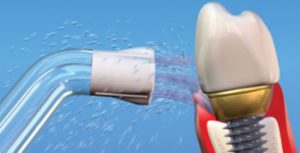
Using a Waterpik is a great way of cleaning your dental implant
Caring for dental implants is somewhat similar to caring for your natural teeth. Simply brush and floss the dental implant as you would with any other tooth. Be sure to keep your regular dental cleanings to avoid bone loss around the implant. Luckily, dental implants don’t develop tooth cavities the same way that natural teeth do. This is because dental implants are synthetic metal-based objects. However, you still need to clean the dental implants to avoid losing the supporting jawbone. Talk to your dentist if you have questions regarding how to maintain your dental implants.
Dental implants in San Clemente, CA

Be sure to give us a call if you're looking for quality, affordable dental implants in Orange County, CA
Call us if you are looking for quality, affordable dental implants. We are located in San Clemente, CA, and serve all of southern California. Schedule your dental implant consultation with Dr. Jazayeri by calling (949)481-2540 or book online today. Don't wait any longer! Give us a call today to see how dental implants can change the way you eat, talk, and look. Dental implants don't just change your appearance, they change your life. If you're ready to get started, fill out the following form and we will contact you soon:
To learn more about other implant-related topics, click on the following links:
